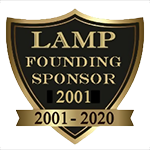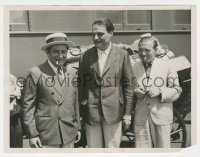eMoviePoster.com
Find similar items:
ERNST LUBITSCH/PETER LORRE ERNST LUBITSCH/PETER LORRE 8x10 OR search current auctions Auction History Result 5y1631 ERNST LUBITSCH/PETER LORRE 7x9.25 news photo 1936 w/ Austrian playwright Ferdinand Bruckner! Date Sold 2/13/2024Sold For: Login or Register to see sold price. An Original Vintage 7" x 9 1/4" [18 x 23 cm] News Photo (Learn More) Ernst Lubitsch was born in Berlin, Germany in 1892, to Russian/Jewish immigrants, and he was expected to become a tailor like his father. If he had done so, the movies would have been robbed of one of its greatest directors ever, and his sophisticated romantic comedies were so distinctive (and wonderful) that they were described as having "the Lubitsch touch"! But when Lubitsch first decided to not be a tailor, in 1911, it was to become a stage actor. A year later he made his first movie, and he was in 23 of them between 1914 and 1916 alone! But in 1914, he had also begun to direct (often directing himself), and in 1920, after having appeared in 36 movies, and directing 38, he decided to quit acting and concentrate on directing. His first big successes were historical melodramas, Madame Du Barry, Anna Boleyn, and Carmen. American star Mary Pickford saw his work and hired him to direct her in the U.S. in Rosita. They clashed during the filming, but he stayed in the U.S. and he signed a deal to make six pictures for Warner Bros, and he was given "final cut" privileges, something rarely ever given, and cherished by directors! It was here that Lubitsch first made his first trademark sophisticated romantic comedies. But those films were not big successes, and Warners sold his contract to MGM. This was the time of the beginning of sound movies, and Lubitsh added both sound and music to his comedies, with great success. In 1932, he directed Trouble in Paradise for Paramount, and it was written by Samson Raphaelson, and starred Herbert Marshall, Kay Francis, and Miriam Hopkins. Many people, myself included, consider this the best romantic comedy ever made, and if you have never seen it, I envy you the joy you will have once you do! In 1935, Paramount was so taken with Lubitsch (and his success) that he became head of the studio, the only director ever to both head a major studio and still direct movies. But he could not do both, and he was fired after a year. In 1939, Lubitsch signed a contract with MGM and made Ninotchka (a comedy with the ultra-serious actress Greta Garbo, promoted as "Garbo Laughs") and The Shop Around the Corner, which again paired Lubitsch with writer Samson Raphaelson. The movie is set in Budapest, and it has two co-workers who bicker by day and write love letters to each other by night, and it is a marvelous movie that also simply must be seen (and please try to see it before seeing either of the re-makes, In the Good Old Summertime, or You've Got Mail). In his later life, Lubitsch was in poor health and he suffered a series of heart attacks, and one in 1947 proved fatal. He was 55 years old. The story (perhaps apocryphal) goes that when legendary director Billy Wilder left his funeral he said, "No more Lubitsch" to which equally legendary director William Wyler replied, "Worse than that. No more Lubitsch pictures."! Some of his other movies include: Love Parade (nominated for the Best Director Academy Award for this film), The Patriot (nominated for the Best Director Academy Award for this film), and The Merry Widow. AND Peter Lorre (born Laszlo Lowenstein) was an Austro-Hungarian born (in what is now Slovakia) actor from the 1920s to the 1960s. He was an incredible actor, but because of his small size, odd looks, and thick accent, he was limited in the types of roles he could play. He started out in German movies, and had the starring role in Fritz Lang's "M" in 1931, and in 1933, he left Germany, because he was Jewish and knew he needed to escape the Nazis, and he moved to London, where he made "The Man Who Knew Too Much" for Alfred Hitchcock. Harry Cohn, the head of Columbia Pictures, was very taken by Lorre and signed him to a contract, and for eight months, he allowed Lorre to research several projects, trying to find the perfect one for which he would make his Hollywood debut in. But Lorre wanted to make "Kaspar Hauser", and perhaps Cohn did not feel it was commercial enough, because the movie was never made, and then Cohn loaned Lorre to MGM to star in "Mad Love", so ironically, his Hollywood debut was not for Columbia, who had invested so much in him! After making "Crime and Punishment" for Columbia in the U.S. with Josef von Sternberg in 1935, he then returned to England to make "Secret Agent", again with Alfred Hitchcock. He then permanently moved to Hollywood, but Columbia had difficulty finding roles worthy of him, and he left the studio in 1937. He then starred in a series of "Mr. Moto" movies for 20th Century-Fox, where he played a Japanese detective. He was considered for the title role in "Son of Frankenstein", but he didn't want to make another horror movie, but those were mostly all he was being considered for, and he appeared in "Stranger on the Third Floor" and "You'll Find Out" for RKO. He then got another breakout role as Joel Cairo in "The Maltese Falcon" in 1941, and he followed it with another wonderful performance as Ugarte in "Casablanca" the next year, and he appeared in seven more movies with Sidney Greenstreet at Warner Bros. He had another wonderful performance as Dr. Einstein in Frank Capra's "Arsenic and Old Lace" in 1944, a black comedy. His later years did not have as many memorable performances, but he was the very first James Bond villain in the 1954 TV adaptation of "Casino Royale", and he stood out in the 1954 Disney movie "20,000 Leagues Under the Sea", and he was wonderful opposite Steve McQueen in the 1960 "Man from the South" episode of "Alfred Hitchcock Presents". In the early 1960s, he made some appearances in Roger Corman movies. He passed away in 1964 at the age of 59. Important Added Info: Note that this news photo, which measures 7" x 9 1/4" [18 x 23 cm], is from when famed director Ernst Lubitsch brought Austrian playwright Ferdinand Bruckner to Hollywood to adapt his Broadway play "The Private Life of Napoleon" for the screen, with Peter Lorre playing the title role. Unfortunately, the movie was never made, which is a real shame, because we think Lorre would have made a fascinating Napoleon! Condition: good to very good. There is a diagonal crease at top center that runs into the man's hair and paper loss in the bottom right corner. Learn More about condition grades 

Postal Mailing Address:
Bruce Hershenson, P.O. Box 874, West Plains, MO 65775. (For our UPS or FedEx address, click here) phone: +1 417 256-9616 fax: +1 417 257-6948 E-mail: Contact Us Hours of Operation: Monday - Friday 8:30 AM - 12:00 PM & 1:00 PM - 5:00 PM (CST) |
|||||||||||||







